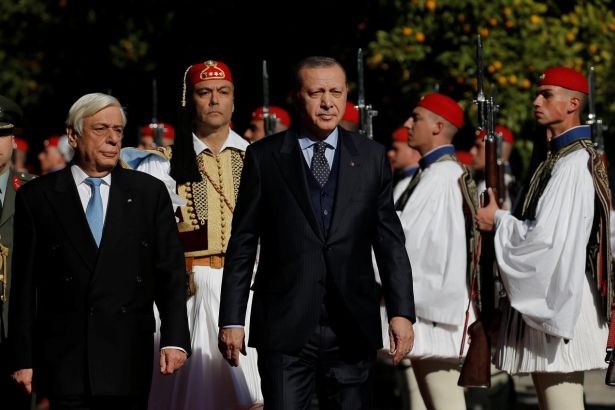Tense start for Turkey's Erdoğan visit to Greece

The first official visit by a Turkish president to Greece in six decades got off to a tense start Thursday, with Recep Tayyip Erdoğan repeating comments that have alarmed his Greek hosts about the need to "update" the 1923 treaty.
At his meeting with Greek President Prokopis Pavlopoulos, Erdoğan raised the issue of reviewing the 1923 Treaty of Lausanne, which established Turkey's new borders and marked the end of the Ottoman Empire.
The presidents engaged in a thinly-veiled verbal spat over the treaty and the Muslim minority in northeastern Greece. Erdoğan's two-day visit will include a trip Friday to meet with members of the community, who Greece recognises only as a religious minority. The status of the Greece's Muslims, which Turkey considers a Turkish minority, was also determined by the Treaty of Lausanne.
There are "some subtleties" in the treaty that are not clear, according to Erdoğan, who added that the world had changed in the 94 years since the treaty was signed. Pavlopoulos, in turn, stated that the treaty was not subject to discussion and needed no reviewing.
"In fact, all agreements in the world should be updated with the passage of time," Erdoğan said. "This happened in Lausanne, that happened in Lausanne. I get that, but let's now quickly do what is necessary. This update would be beneficial not only for Turkey but also for Greece," he told the Greek president.
Erdoğan said Muslims in the Greek border region of Western Thrace were not able to choose their own chief mufti, while Christian communities in Turkey enjoyed greater freedom to choose their patriarchs, suggesting the 1923 Lausanne treaty was not being applied fairly.
Pavlopoulos told Erdoğan the treaty "doesn't need revision or updating. It is valid as is." He added the treaty didn't allow space for territorial disputes and clearly set out the status for Greece's Muslim minority.
"It is clear that to achieve our goals and to make this visit a historic one ... this requires the full respect of international law," Pavlopoulos said.
In a tense back and forth between the two leaders, Erdoğan also said Greece could not have entered the NATO without Turkey's support.
The Treaty of Lausanne was signed between France, Greece, Italy, Japan, Romania, the United Kingdom, and Yugoslavia, on one side, and Turkey on the other.
Erdoğan's televised chat with Prime Minister Alexis Tsipras immediately afterward was calmer. "We agreed to resume talks on confidence-building and security measures," Greek Prime Minister Alexis Tsipras said at a news conference after a long meeting with Erdoğan.
Turkish president demanded the extradition of suspected coup plotters from Greece, referring to eight soldiers who flew to northern Greece during the failed coup attempt last year.




